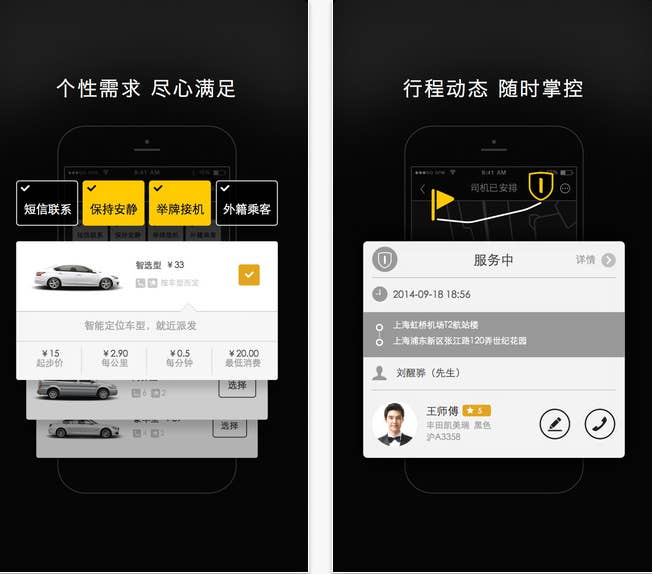
Starting next week in Beijing, riders of the most popular transportation app in China won't have to worry about driving home after a night out. The recently merged companies Kuaidi Dache and Didi Dache (there is no plan to bring the two companies' names under one service) are banding together to roll out a designated driver service that lets riders request a driver to pick up their car and drive them home.
Riders won't have to wait long to be picked up — the company's designated driver service has already signed up 30,000 drivers.
In theory, the service is similar to any standard ride-hail: pull up the app, hit a button, the app will find the nearest driver, connect the two, and then the driver will meet the rider at their car. For the service each driver is equipped with an electric scooter — provided by the company — that he or she will use to scoot over to and from the customer's car.
The company is using a tiered-pricing feature that mimics that of its existing services. Before 10:00 p.m. there is a lower base fare, and then after midnight the price to request a designated driver will increase — but not by much, according to Lee. "For example, after 12:00 a.m. if you are going within 10 km it will cost 99 RMB, which is around $15."
Currently, the company is only offering the service at night and only in Beijing. But Kuaidi co-founder and chief strategy officer Joe Lee told BuzzFeed News that over time Kuaidi and Didi plan to scale it into different parts of the day and many new cities.
"We're looking at covering at least 60 top-tier and second-tier cities by the end of the year," Lee said. "Just like the limo service that we offer, we spent six months expanding it into 60 cities. [Also] in the first phase of our limo business we focused on clubs and bars and then found that there were people who needed it during the day and then made it available. We'll do the same with this service."
When Kuaidi Dache and Didi Dache merged in February to become the largest transportation company in the country, Lee told BuzzFeed News that he wanted the app to become an all-around transportation platform and move beyond taxis and limos. The designated driver service is the first of many planned initiatives, which include carpooling and shuttle services.
Beyond the technical challenges of developing an efficient carpooling service, Lee said simply gaining the trust of its Chinese citizens can be difficult. In an earlier interview Lee said: "In China people are lacking of trust of each other. But we already broke that lack of trust issue with the [feedback system] for riders and drivers. I think that we can use this [newly established trust] to introduce carpooling."
While the newly merged Kuaidi and Didi Dache to snatch up ride-hail market share in China, Uber has struggled against regulatory challenges in the region. Yesterday evening, local authorities raided and then shut down an Uber office in the city of Guangzhou for "unlicensed operations."
An Uber spokesperson told BuzzFeed News the company is working closely with the authorities "to continue to offer our service to the residents of Guangzhou."
According to Lee, the issues stem from Uber's failure to cultivate a strong relationship with local authorities. "From the government officials that I personally or my team has been in touch with, Uber doesn't have a very strong relationship with them and they don't know the policies," Lee said. "As you can imagine, the most important part is you have to spend a lot of time talking to the government."
Currently, the Chinese market represents an unfamiliar position for Uber. Though the ride-hailing giant recently received funding from Chinese web services market Baidu, the company is still struggling to compete with the homegrown transportation alliance. After the merger, Didi-Kuaidi are in 350 cities, while Uber maintains a foothold in only in nine mainland cities. And while Uber has had only limited success with its core ride-hailing services in the country, Didi-Kuaidi is beginning to expand its reach into nontraditional transportation options.
Meanwhile, according to Didi-Kuaidi spokesperson Rebecca Dubow, the China-native transportation company is operating without issue throughout China.
"After the merger we thought we would double our team so we can take some time off," Lee said. "But it seems we're gong to launch a lot more services so we could not rest. I think 2015 is going to be a very exciting year."
